Wayne Rooney: What next for England & Man Utd captain?
- Published
- comments
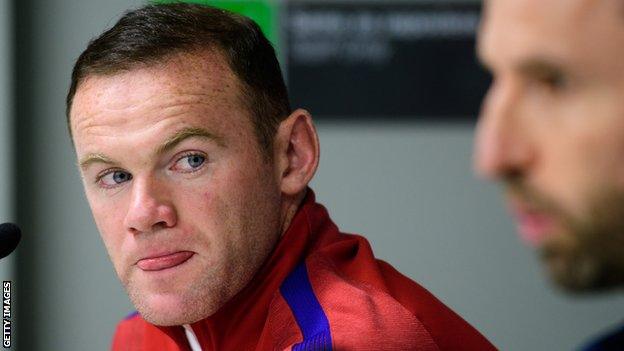
Wayne Rooney is facing the toughest period in his career after being dropped by England
Wayne Rooney's stellar career has been a headline-grabbing story of highs and lows - but he is at his lowest ebb after being dropped by Manchester United and now England.
He was once the first name on the teamsheet on the way to collecting regular silverware for his club, becoming England's record goalscorer and being appointed captain at Old Trafford and for his country.
Rooney, 31 on 24 October, has suffered his latest dramatic decline in status after he was left out by England interim manager Gareth Southgate for the World Cup qualifier in Slovenia, less than a month after suffering a similar fate at United.
He has been one of British football's most significant and influential figures since emerging as a 16-year-old at Everton in 2002 - but are we now reaching the end of the Rooney era?
Should England now ditch Rooney?
Simple answer - no.
Rooney's defiant and measured response to his exclusion holds the key to this question, while England and Southgate will be well aware of the dangers of discarding the man who has scored an outstanding 53 goals in 117 appearances for his country.
He is moving increasingly to the margins but it was only in June that then England manager Roy Hodgson was lambasted for leaving Rooney out as one of six changes for the Euro 2016 game against Slovakia.
It was Rooney's exclusion that drew the most intense scrutiny around England's 0-0 draw, a damaging result when victory would have ensured they topped Group B.
Rooney is widely respected within England's squad, not just as a player but as character and leader. He has developed into a mature spokesman and is regarded as a superb influence, especially with younger players.
And for all his struggles and falling away from the brilliance that made his name, he has not declined to the point where he should be ditched completely from a squad still in recovery from the fiasco of Euro 2016, when England were knocked out in the last 16 by minnows Iceland.
Wayne Rooney: England captain to keep his role under Gareth Southgate
The problem he has, and which Southgate has tackled, is that he is no longer good enough to be a natural fit in England's team. It is a difficulty he is also encountering at Manchester United.
Rooney played in a deep-lying midfield role in the 2-0 win against Malta, a position in which Tottenham's Eric Dier, who will be there against Slovenia, is better. He has been overtaken as the best 'number 10' by Spurs' Dele Alli, while Liverpool's Daniel Sturridge and Harry Kane, also of Tottenham, will be ahead as strikers when fit.
These are all factors that mean his days as a first choice for England are now over.
Southgate's decision is, in its starkest terms, the beginning of the end of an England career that is scheduled to finish at the 2018 World Cup in Russia.
England's manager spoke about leaving Rooney out as "a football decision." It almost sounded like an attempt to sugar the pill - instead it revealed the brutal truth.
England are not yet in a position, however, where they are good enough to jettison a player of Rooney's ability and the experience he has gathered since making his international debut at just 17 years and 111 days in a 3-1 defeat to Australia at Upton Park in February 2003.
Southgate grasps the nettle
Gareth Southgate's eyebrows have started to head skywards at suggestions that he is "too nice" for the ruthless cut and thrust of management, especially with England.
The 46-year-old used the fact that he was forced to make close friends redundant at Middlesbrough as proof of his steel - and his decision to axe Rooney means that debate is over.
Southgate is regarded as a gentleman by those who know him well, but the accusations this means he is unable to make the tough moves now fall on stony ground.
He confirmed Rooney as captain after Sam Allardyce's departure, spoke glowingly about him after the Malta game, praising how he copes with the fierce attention he commands and how he shows such passion and commitment in turning up to represent England.
And then dropped him.
England managers such as Fabio Capello and Hodgson were often urged to exclude Rooney, but it was in Southgate's four-game interim reign that crunch time arrived and he acted decisively.
It might have been easier for Southgate to play Rooney in Slovenia then leave him out for the qualifier against Scotland at Wembley on 11 November because his situation at Old Trafford means he may have been able to make the move based on a lack of first-team action. He did not take the easy route.
Southgate, who presented Rooney with a special cap for becoming England's most-capped outfield player before the Malta game, has been brave in the way he also wants his team to be - but he will not be foolish enough to alienate such a figure of influence or cast him aside too soon.
Can Rooney bounce back?
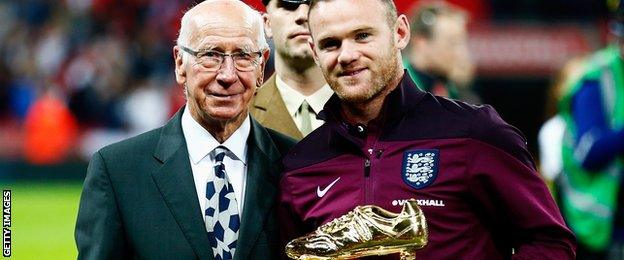
Wayne Rooney is England's record scorer with 53 goals and was presented with a Golden Boot by Sir Bobby Charlton after breaking his record of 49 goals in 2015
It spoke volumes for Rooney's character and commitment that he was front and centre at England's pre-match media conference in Ljubljana even though he knew his own omission would be the only story in town and his entire international career would dominate the agenda.
He was there to make it clear he was going nowhere.
This, after all, is a player with five Premier League titles, a Champions League, an FA Cup and two League Cups to his name - but has he got the legs to stick around?
The problem now is the number of miles on Rooney's clock. And it is starting to show.
His Premier League career started as a 16-year-old with Everton in a 2-2 draw against Spurs on Saturday, 17 August 2002.
He has since played a total of 724 games for Everton, Manchester United and England, scoring 316 goals. Rooney has scored 246 goals for United, just three short of Sir Bobby Charlton's club record.
This represents a mammoth workload and the toll it has taken is becoming evident. Rooney is retreating away from areas where he can do damage, too often taking on the 'quarterback role' spraying passes. The trademark, game-shaping surges with pace and power of old now seem beyond him.
Time and tide wait for no man in football. The game does not allow even the greats to turn back time and Rooney is just another victim.
Southgate was at pains to stress this was a decision based on what is required against Slovenia - but the idea of England tackling any opposition without Rooney was unthinkable not long ago.
And when he was left out at Manchester United, manager Jose Mourinho was also soothing Rooney's anguish as he said: "He's my man. I trust him completely. He's as happy as I am at this moment. He's a big player for me, for United, a big player for this country."
United and England team-mate Chris Smalling was equally fulsome, saying: "Whatever the situation is, whatever game, whether he is on the bench or playing or whatever, he is always that same type of character and that's why he is England's main man and our main man."
Except that he is not - not any more. Rooney is being showered in compliments as he is being shown to the bench.
Rooney's natural fire for football also seems to have been extinguished in recent times - but could it be the twin blows inflicted by United and England will re-ignite the flame that once burned so fiercely?
Time will tell.
What's next for Wayne Rooney?
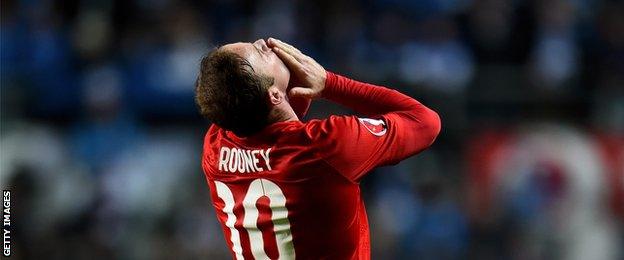
Rooney has scored 316 goals for Everton, Manchester United and England
Rooney is now in uncharted territory - no longer an automatic choice for Manchester United and England and no longer feeling the unconditional love of supporters who once adored him.
The jeering aimed at him at Wembley on Saturday came from a tiny minority, while at United his relationship with fans has not fully recovered from the saga in October 2010 when he wanted to leave and appeared to question the club's ambition and quality of the squad before signing a new deal.
Rooney signed another five-and-a-half-year contract worth around £300,000 a week in February 2014 - a deal which means he is unlikely to be going anywhere fast.
He is unlikely to attract suitors in the Premier League or abroad given his age and salary, so the only serious future options appear to be China and the United States.
It remains to be seen whether Rooney still has the profile to match anything like his current earnings in Major League Soccer, which boasts former England colleagues Steven Gerrard and Frank Lampard.
He has been linked with a lucrative deal to join his former England manager Sven-Goran Eriksson at Shanghai SIPG in China. This is where the big riches reside away from Europe - but would it appeal to Rooney and his young family?
For now at least it looks like Rooney will stay to face the biggest fights of his football career with Manchester United and England.
- Published9 October 2016
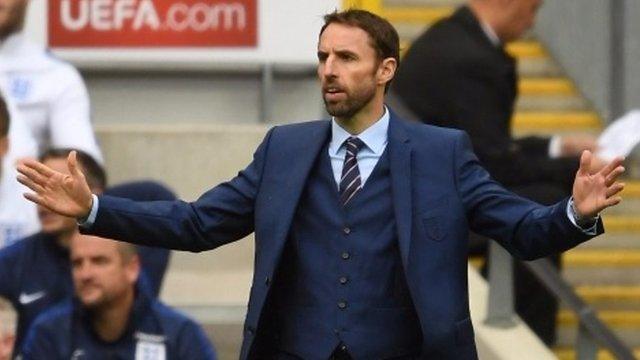
- Published14 January 2018
- Published8 August 2017
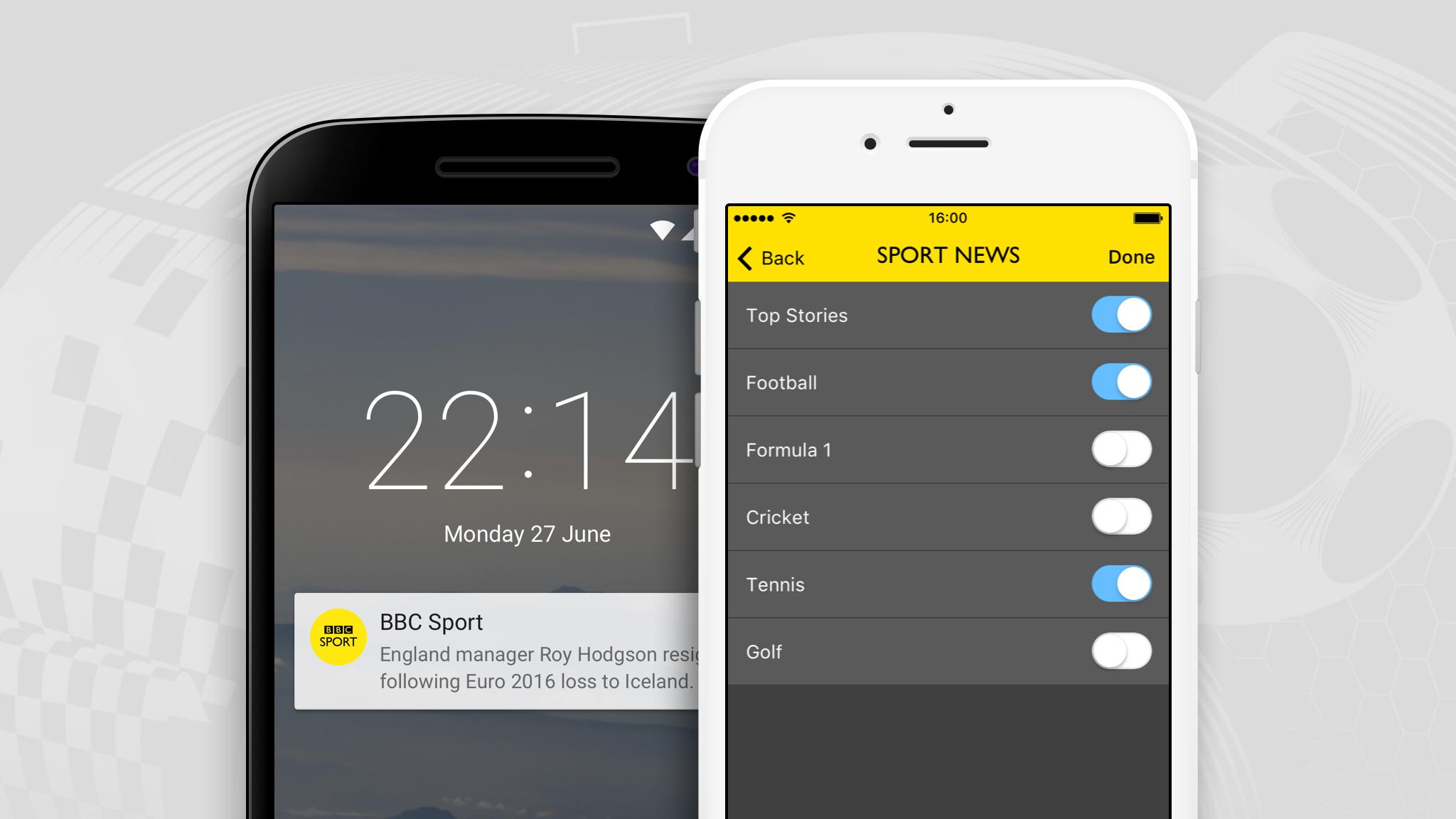
- Published7 June 2019
